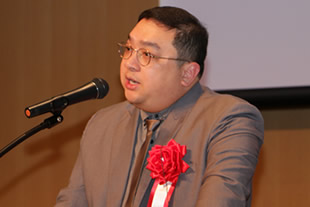 The 22nd Asia Pacific Research Prize - Commendation winner: Dr. Kritdikorn Wongswangpanich
The 22nd Asia Pacific Research Prize - Commendation winner: Dr. Kritdikorn Wongswangpanich
Title of Dissertation: “Sick Kingdom: The Role and Politics of Thai Health Care in the Domination of Bhumibol’s Narrative”

- Dr. Kritdikorn Wongswangpanich
-
- Career -
Kritdikorn Wongswangpanich is currently a researcher at Science Technology and Innovation Policy Institute (STIPI) of King Mongkut's University of Technology Thonburi (KMUTT), Thailand. He received his B.A. from the Department of International Relations, Faculty of Political Science, Chulalongkorn University. He, then, received his MSc. in Terrorism and International Relations from the Department of International Politics, Aberystwyth University. From 2017, he began to conduct the research focusing on the theoretical framework of Thai politics and its narrative structure that has been built by the medical network as an important player in the Thai royal faction. Based on this research, he received his Ph.D. from the Graduate School of Asian and African Areas Studies (ASAFAS), University of Kyoto in 2022.
- Summary -
The work asks why Thais blindly followed King Bhumibol’s narrative, a counter-progressive reasoning, for decades. Answering this question led to conceptual frameworks to capture Bhumibol's rational structure and transformation, which was based on Buddhist teaching and narrated by the network monarchy, including the health service. The work focuses on one agency?the medical network?because its narrative imposed "Thainess" or "Salim" rationality on the people, which became its cultural and institutional shield.This dissertation examines Bhumibol's narrative and how time changes its production and preservation. The work realized the four main storylines which composed into Bhumibol’s narrative that based themselves on two Theravada Buddhist logics. The four main storylines are: From Dad, (Be) Like Dad, For Dad, and Replacing Dad. All of them depicted King Bhumibol as the holy father of the nation. The 2 Buddhist logics are Dhammayuttika Nikaya which was devised by Chaofah Mongkut (later King Rama IV) and Revised Theravada Buddhism offered by Buddhadasa.
From Dad storyline worked with Dhammayuttika Nikaya to create the depiction of the king as the personification of benevolence and cause the citizens to feel forever indebted to the king. (Be) Like Dad storyline worked with the Revised Theravada Buddhism depicted the supreme role model of the “selflessness dogma” and urged people to follow the king’s path. These two cases caused two different dominant ultra-conservative rationality in Thailand: the cult of persona and its followers, Salim Fundamentalist, and the cult of dogma and its followers, Progressive Salim.
These storylines and rationalities become the basis of King Bhumibol’s narrative structure which dominated and constrained Thai citizens from acknowledging or even realizing the significance of democracy, and hence the lack of successful democratization. The narrative structure had reined Thai society to the point that it bred a new storyline reflecting its dominance, namely For Dad storyline. This is the storyline the combined the achievement of the first two storylines, granting King Bhumibol the status of the narrative owner of the Thai state. Everything conducted must be for the sake of the king.
This situation went on until cracks appeared that are the rise of Thaksin and Thai Rak Thai (TRT) and the rise of Future Forward Party (FFP). The cracks caused new waves of counter-Bhumibol’s narrative and the attempts for democratization which eventually forced the conservative camp to brew a new storyline to replace the void left by the deceased king.






